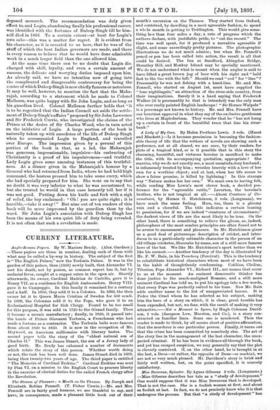A Lady of My Own. By Helen Prothero Lewis. 3
vols. (Hurst and Blackett.)—Is it because pessimism is becoming the fashion- able theory of life that the writers of novels are showing such a preference, not at all shared, we are sure, by their readers, for plots of a tragical kind, or is it possible that in this story the charming, beautiful, and virtuous heroine is sacrificed to make the title, with its accompanying quotation, appropriate ? She marries, why we do not exactly see, a most unsatisfactory husband is infamously treated by him ; wrestles bravely with a love of her own for a worthier object; and at last, when her life seems to show a fairer promise, is killed by lightning ! In this strange way " Nature makes her her own." We must own to having felt, while reading Miss Lewis's most clever book, a decided pre- ference for the " agreeable rattle," Leverton, the heroine's brother, who is not tragical at all.—About Creatures of Cir- cumstance, by Horace G. Hutchinson, 3 vols. (Longmans), we have much the same feeling. Here, too, there is a gloomy vein and a cheerful. The title indicates a certain leaning to pessimism, for if we are indeed " creatures of circumstance," the darkest views of life are the most likely to be true. On the other hand, there is something to relieve the gloom, as, indeed, philosophers of the most sombre principles are often found not to be averse to amusement and pleasure. So Mr. Hutchinson gives us a good deal of picturesque description of cricket, and intro- duces to us a particularly estimable character in the person of an old village cricketer, Slocombe by name, son of a still more famous hero of the bat. We like Mr. Hutchinson's sport better than we like his earnest.—Another tendency of the day is illustrated by Mr. F. W. Bain, in his Treachery (Percival). This is the tendency to rehabilitate historical characters whom most of us have been in the habit of thoughtlessly condemning. Catiline, Clodius, Tiberius, Pope Alexander VI., Richard III., are names that occur to us at the moment. An eminent democratic thinker has done justice to the much-maligned Romans, and a still more eminent Cardinal has tolci us, to put his apology into a few words, that every Pope was perfectly suited to his time. Now Mr. Bain adds another name to the list of unappreciated heroes. It is Pedro the Cruel whom he has selected as his subject, making him the hero of a story on which, it is clear, great trouble has been expended, but not, we fear, with the result of making it very attractive.—Not a Moment to Spare, by Hugh Coleman David- son, 2 vols. (Sampson Low, Marston, and Co.), is a story con- structed on familiar lines. Some one is murdered. Then the reader is made to think, by all means short of positive affirmation, that the murderer is one particular person. Finally, it turns out that the crime has been committed by somebody else. The art of the story lies in the management of the last character, the unex- pected criminal. If he has been in evidence all through the book, and yet has escaped suspicion, we may generally say that the plot is cleverly contrived. If, on the other hand, he is brought in at the last, a Deus—or rather, the opposite of Deus—ez ma-china, we are not so very much pleased. Mr. Davidson's story is brisk and fairly well written, but, on the point specified, it is scarcely satisfactory.


















































 Previous page
Previous page